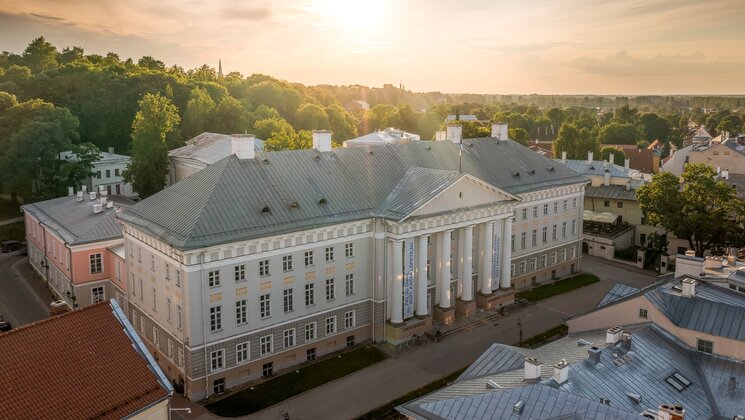-
Faculty of Arts and HumanitiesDean's Office, Faculty of Arts and HumanitiesJakobi 2, r 116-121 51005 Tartu linn, Tartu linn, Tartumaa EST0Institute of History and ArchaeologyJakobi 2 51005 Tartu linn, Tartu linn, Tartumaa EST0Institute of Estonian and General LinguisticsJakobi 2, IV korrus 51005 Tartu linn, Tartu linn, Tartumaa EST0Institute of Philosophy and SemioticsJakobi 2, III korrus, ruumid 302-337 51005 Tartu linn, Tartu linn, Tartumaa EST0Institute of Cultural ResearchÜlikooli 16 51003 Tartu linn, Tartu linn, Tartumaa EST0Institute of Foreign Languages and CulturesLossi 3 51003 Tartu linn, Tartu linn, Tartumaa EST0School of Theology and Religious StudiesÜlikooli 18 50090 Tartu linn, Tartu linn, Tartumaa EST0Viljandi Culture AcademyPosti 1 71004 Viljandi linn, Viljandimaa EST0Professors emeritus, Faculty of Arts and Humanities0Associate Professors emeritus, Faculty of Arts and Humanities0Faculty of Social SciencesDean's Office, Faculty of Social SciencesLossi 36 51003 Tartu linn, Tartu linn, Tartumaa EST0Institute of EducationJakobi 5 51005 Tartu linn, Tartu linn, Tartumaa EST0Johan Skytte Institute of Political StudiesLossi 36, ruum 301 51003 Tartu linn, Tartu linn, Tartumaa EST0School of Economics and Business AdministrationNarva mnt 18 51009 Tartu linn, Tartu linn, Tartumaa EST0Institute of PsychologyNäituse 2 50409 Tartu linn, Tartu linn, Tartumaa EST0School of LawNäituse 20 - 324 50409 Tartu linn, Tartu linn, Tartumaa EST0Institute of Social StudiesLossi 36 51003 Tartu linn, Tartu linn, Tartumaa EST0Narva CollegeRaekoja plats 2 20307 Narva linn, Ida-Virumaa EST0Pärnu CollegeRingi 35 80012 Pärnu linn, Pärnu linn, Pärnumaa EST0Professors emeritus, Faculty of Social Sciences0associate Professors emeritus, Faculty of Social Sciences0Faculty of MedicineDean's Office, Faculty of MedicineRavila 19 50411 Tartu linn, Tartu linn, Tartumaa ESTInstitute of Biomedicine and Translational MedicineBiomeedikum, Ravila 19 50411 Tartu linn, Tartu linn, Tartumaa ESTInstitute of PharmacyNooruse 1 50411 Tartu linn, Tartu linn, Tartumaa ESTInstitute of DentistryL. Puusepa 1a 50406 Tartu linn, Tartu linn, Tartumaa ESTInstitute of Clinical MedicineL. Puusepa 8 50406 Tartu linn, Tartu linn, Tartumaa ESTInstitute of Family Medicine and Public HealthRavila 19 50411 Tartu linn, Tartu linn, Tartumaa ESTInstitute of Sport Sciences and PhysiotherapyUjula 4 51008 Tartu linn, Tartu linn, Tartumaa ESTprofessors emeritus, Faculty of Medicine0associate Professors emeritus, Faculty of Medicine0Faculty of Science and TechnologyDean's Office, Faculty of Science and TechnologyVanemuise 46 - 208 51003 Tartu linn, Tartu linn, Tartumaa ESTInstitute of Computer ScienceNarva mnt 18 51009 Tartu linn, Tartu linn, Tartumaa ESTInstitute of GenomicsRiia 23b/2 51010 Tartu linn, Tartu linn, Tartumaa ESTEstonian Marine Institute0Institute of PhysicsInstitute of ChemistryRavila 14a 50411 Tartu linn, Tartu linn, Tartumaa ESTInstitute of Mathematics and StatisticsNarva mnt 18 51009 Tartu linn, Tartu linn, Tartumaa EST0Institute of Molecular and Cell BiologyRiia 23, 23b - 134 51010 Tartu linn, Tartu linn, Tartumaa ESTTartu ObservatoryObservatooriumi 1 61602 Tõravere alevik, Nõo vald, Tartumaa EST0Institute of TechnologyNooruse 1 50411 Tartu linn, Tartu linn, Tartumaa ESTInstitute of Ecology and Earth SciencesJ. Liivi tn 2 50409 Tartu linn, Tartu linn, Tartumaa ESTprofessors emeritus, Faculty of Science and Technology0associate Professors emeritus, Faculty of Science and Technology0Institute of BioengineeringArea of Academic SecretaryHuman Resources OfficeUppsala 6, Lossi 36 51003 Tartu linn, Tartu linn, Tartumaa EST0Area of Head of FinanceFinance Office0Area of Director of AdministrationInformation Technology Office0Administrative OfficeÜlikooli 17 (III korrus) 51005 Tartu linn, Tartu linn, Tartumaa EST0Estates Office0Marketing and Communication OfficeÜlikooli 18, ruumid 102, 104, 209, 210 50090 Tartu linn, Tartu linn, Tartumaa EST0Area of Vice Rector for ResearchUniversity of Tartu LibraryW. Struve 1 50091 Tartu linn, Tartu linn, Tartumaa EST0Grant OfficeArea of Vice Rector for DevelopmentCentre for Entrepreneurship and InnovationNarva mnt 18 51009 Tartu linn, Tartu linn, Tartumaa EST0University of Tartu Natural History Museum and Botanical GardenVanemuise 46 51003 Tartu linn, Tartu linn, Tartumaa EST0International Cooperation and Protocol Office0University of Tartu MuseumLossi 25 51003 Tartu linn, Tartu linn, Tartumaa EST0Area of RectorRector's Strategy OfficeInternal Audit OfficeArea of Vice Rector for Academic AffairsOffice of Academic AffairsUniversity of Tartu Youth AcademyUppsala 10 51003 Tartu linn, Tartu linn, Tartumaa EST0Student Union OfficeÜlikooli 18b 51005 Tartu linn, Tartu linn, Tartumaa EST0Centre for Learning and Teaching
International confrence: "Denunciation – Creating a Culture of Fear"
Conference Organizers: Vladimir Sazonov (University of Tartu), Alevtina Solovyeva (University of Tartu), Sonja John (Hessische Hochschule für öffentliche Management und Sicherheit), and Sebastian Fink (University of Innsbruck).
Call for Papers
Denunciation – the act of accusing someone in front of state officials of divergent or delinquent behavior – can have far-reaching effects on individual and societal levels. Throughout history and regions, denunciation has caused the death of the denounced person and led to a widespread distrust and fear that undermines social cohesion. Denunciation is a phenomenon we can grasp throughout world history. In Neo-Assyrian treaties we find the demand to report evil speech against the ruler, in Medieval times heretics and later on witches were denounced. In the states of the Soviet Union German research focuses on the (lack of) accountability of denunciation during the Nazi regime (Halbrainer/Kuretsidis-Haider 2007) or the “dimensions of betrayal” during the GDR system (Krätzner-Ebert 2023). Besides the fear of being monitored by state actors like the police or secret services, an especially problematic case is denunciation by fellow citizens, friends and family. “Denunciation as social practice” can result in the creation of a culture of fear and the acceptance of a culture of denunciation (Hornung 2010).
Undermining social cohesion can be the aim of hybrid warfare or the result of despotic or simply bad politics. One of the consequences of influence activity can be a culture of fear and panic in society due to the insecurity created by crises or war. A culture of fear precipitates insecurity, instability and anxiety in social discourses and relationships caused by emotional reactions (Mölder 2011: 241). The culture of fear may even appear to increase solidarity in societies, but the irrational decisions that are taken in response to it, the constant need to introduce ever new measures that pretend to be crisis management, other tactical miscalculations can lead in the long term to large-scale strategic errors and global miscalculations with negative social and political consequences. The sense of social unity achieved through a culture of fear is never effective, as society does not evolve but focuses all its energies on self-preservation (Mölder 2018: 69).
This conference will investigate the reasons for denunciation and coping mechanisms. Aiming at providing a solid background for the analysis of denunciation, we welcome papers that investigate the historical development of denunciation from its origins in the ancient world to modern times from an international and interdisciplinary perspective.
Papers are welcomed that touch on the following themes, but may not be limited to them:
1. Denunciation and the law
2. Denunciation in history (i.e. Egypt, Mesopotamia, Greece, Rome, Middle Ages, Modern Era, USSR, Communist China, Third Reich, Francõ’s Spain, Mussolini’s Italy and other dictatorial, communists and fascist regimes of the 19th-20th century in Europe, Asia, Africa and Latin America)
3. Social, economic, political and cultural aspects and effects of denunciation
4. How did the COVID-19 crises affect our approach to denunciation?
5. Denunciation during wartimes (wars in antiquity, wars in Middle Age, Thirty Years' War; Naopoleonic wars, WW I, WW II, Iraq-Iranian war, Russo-Ukrainian war, Israel-Palestine conflicts, Syrian civil war etc.)
6. Denunciation in modern times: of classical snitches and social media finks
7. Official and local authorities of denunciation ?
Please send your paper proposal of approximately 300 words and a short bio to denunciation2024@gmail.com by Feb 1, 2024. Notifications will be sent out by Feb 15, 2024.



